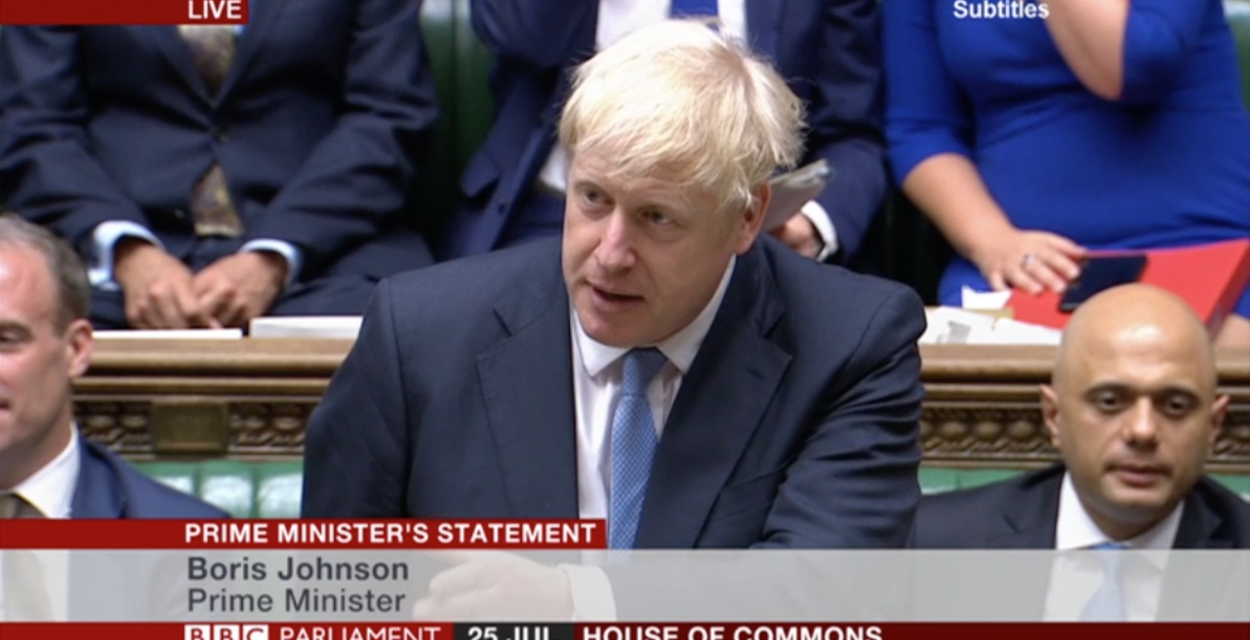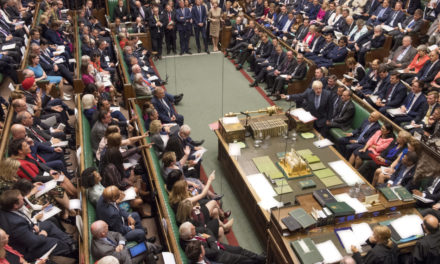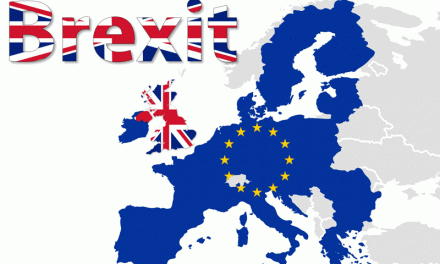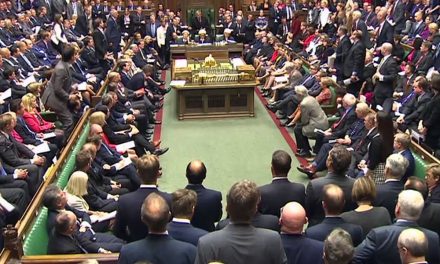Boris Johnson delivered yesterday his first statement to the House of Commons as Prime Minister:
The Prime Minister (Boris Johnson): With permission, Mr Speaker, I shall make a statement on the mission of this new Conservative Government.
Before I begin, I am sure that the whole House will join me in paying tribute to my right hon. Friend the Member for Maidenhead (Mrs May) for all that she has given to the service of our nation. From fighting modern slavery to tackling the problems of mental ill health, she has a great legacy on which we shall all be proud to build.
Our mission is to deliver Brexit on 31 October for the purpose of uniting and re-energising our great United Kingdom and making this country the greatest place on earth. When I say “the greatest place on earth”, I am conscious that some may accuse me of hyperbole, but it is useful to imagine the trajectory on which we could now be embarked. By 2050, it is more than possible that the United Kingdom will be the greatest and most prosperous economy in Europe, at the centre of a new network of trade deals, which we have pioneered. With the road and rail investments that we are making and propose to make now and the investment in broadband and 5G, our country will boast the most affordable transport and technological connectivity on the planet. By unleashing the productive power of the whole United Kingdom—not just of London and the south-east, but of every corner of England, Scotland, Wales and Northern Ireland—we will have closed forever the productivity gap and seen to it that no town is left behind ever again and no community ever forgotten.
Our children and grandchildren will be living longer, happier and healthier lives. Our kingdom in 2050—thanks, by the way, to the initiative of the previous Prime Minister—will no longer make any contribution whatsoever to the destruction of our precious planet, brought about by carbon emissions, because we will have led the world in delivering that net-zero target. We will be the home of electric vehicles—cars and even planes—powered by British-made battery technology, which is being developed right here, right now. We will have the free ports to revitalise our coastal communities, a bio-science sector liberated from anti-genetic modification rules, blight resistant crops that will feed the world, and satellite and earth observation systems that are the envy of the world. We will be the seedbed for the most exciting and dynamic business investments on the planet. [Interruption.]
Mr Speaker: Order. I apologise for interrupting the Prime Minister. There is far too much noise in this Chamber, and there are far too many Members who think it is all right for them to shout out their opinion at the Prime Minister. Let us be clear: it is not. The statement will be heard, and there will be ample opportunity, in conformity with convention, and as established by me over the last decade, for colleagues to question the Prime Minister, but the statement will be heard, and heard with courtesy.
The Prime Minister: Mr Speaker, I applaud your intervention. I also think there is far too much negativity about the potential of our great country, as I think you will agree. Our constitutional settlement, our United Kingdom, will be firm and secure; our Union of nations beyond question; our democracy robust; our future clean, green, prosperous, united, confident and ambitious. That is the prize, and that is our responsibility, in this House of Commons, to fulfil. To do so, we must take some immediate steps. The first is to restore trust in our democracy, and fulfil the repeated promises of Parliament to the people by coming out of the European Union, and by doing so on 31 October.
I and all Ministers are committed to leaving on this date, whatever the circumstances. To do otherwise would cause a catastrophic loss of confidence in our political system. It would leave the British people wondering whether their politicians could ever be trusted again to follow a clear democratic instruction. I would prefer us to leave the EU with a deal; I would much prefer it. I believe that it is possible, even at this late stage, and I will work flat out to make it happen, but certain things need to be clear. The withdrawal agreement negotiated by my predecessor has been three times rejected by this House. Its terms are unacceptable to this Parliament and to this country. No country that values its independence, and indeed its self-respect, could agree to a treaty that signed away our economic independence and self-government, as this backstop does. A time limit is not enough. If an agreement is to be reached, it must be clearly understood that the way to the deal goes by way of the abolition of the backstop.
For our part, we are ready to negotiate, in good faith, an alternative, with provisions to ensure that the Irish border issues are dealt with where they should always have been: in the negotiations on the future agreement between the UK and the EU. I do not accept the argument that says that these issues can be solved only by all or part of the UK remaining in the customs union or in the single market. The evidence is that other arrangements are perfectly possible, and are also perfectly compatible with the Belfast or Good Friday agreement, to which we are, of course, steadfastly committed. I, my team, and my right hon. Friend the Secretary of State for Exiting the European Union are ready to meet and talk on this basis to the European Commission, or other EU colleagues, whenever and wherever they are ready to do so.
For our part, we will throw ourselves into these negotiations with the greatest energy and determination and in a spirit of friendship. I hope that the EU will be equally ready and will rethink its current refusal to make any changes to the withdrawal agreement. If it does not, we will of course have to leave the EU without an agreement under article 50. The UK is better prepared for that situation than many believe, but we are not as ready yet as we should be.
In the 98 days that remain to us, we must turbo-charge our preparations to ensure that there is as little disruption as possible to our national life, and I believe that is possible with the kind of national effort that the British people have made before and will make again. In these circumstances, we would of course have available the £39 billion in the withdrawal agreement to help deal with any consequences. I have today instructed the Chancellor of the Duchy of Lancaster to make these preparations his top priority. I have asked the Cabinet Secretary to mobilise the civil service to deliver this outcome, should it become necessary. The Chancellor has confirmed that all necessary funding will be made available—[Interruption]—£4.2 billion has already been allocated.
I will also ensure that preparing to leave the EU without an agreement under article 50 is not just about seeking to mitigate the challenges, but about grasping the opportunities. This is not just about technical preparations, vital though they are; it is about having a clear economic strategy for the UK in all scenarios—something that the Conservative party has always led the way on—and producing policies that will boost the competitiveness and productivity of our economy when we are free of EU regulations.
Indeed, we will begin right away on working to change the tax rules to provide extra incentives to invest in capital and research. We will now be accelerating the talks on those free trade deals, and we will prepare an economic package to boost British business and lengthen this country’s lead, which seems so bitterly resented by Opposition Members, as the No. 1 destination in this continent for overseas investment—a status that is made possible at least partly by the diversity, talent and skills of our workforce.
I therefore want to repeat unequivocally our guarantee to the 3.2 million EU nationals now living and working among us. I thank them for their contribution to our society and for their patience. I can assure them that under this Government they will have the absolute certainty of the right to live and remain.
I want to end by making clear my absolute commitment to the 31 October date for our exit. Our national participation in the European Union is coming to an end, and that reality needs to be recognised by all parties. Indeed, today there are very many brilliant UK officials trapped in meeting after meeting in Brussels and Luxembourg, when their talents could be better deployed in preparing to pioneer new free trade deals or promoting a truly global Britain. I want to start unshackling our officials to undertake this new mission right away, so we will not nominate a UK commissioner for the new Commission taking office on 1 December—under no circumstances—although clearly that is not intended to stop the EU appointing a new Commission.
Today is the first day of a new approach that will end with our exit from the EU on 31 October. Then I hope that we can have a friendly and constructive relationship, as constitutional equals and as friend and partners in facing the challenges that lie ahead. I believe that is possible, and this Government will work to make it so. But we are not going to wait until 31 October to begin building the broader and bolder future that I have described; we are going to start right away by providing vital funding for our frontline public services, to deliver better healthcare, better education and more police on the streets.
I am committed to making sure that the NHS receives the funds that it deserves—the funds that were promised by the previous Government in June 2018—and these funds will go to the frontline as soon as possible. That will include urgent funding for 20 hospital upgrades and for winter readiness. I have asked officials to provide policy proposals for drastically reducing waiting times for GP appointments.
To address the rising tide of violent crime in our country, I have announced that there will be 20,000 extra police keeping us safe over the next three years, and I have asked my right hon. Friend the Home Secretary to ensure that this is treated as an absolute priority. We will give greater powers—powers resisted, by the way, by the Labour party—to the police to use stop and search to help tackle violent crime. I have also tasked officials to draw up proposals to ensure that in future those found guilty of the most serious sexual and violent offences are required to serve a custodial sentence that truly reflects the severity of their offence and policy measures that will see a reduction in the number of prolific offenders.
On education, I have listened to the concerns of so many colleagues around the House, and we will increase the minimum level of per pupil funding in primary and secondary schools and return education funding to previous levels by the end of this Parliament.
We are committed to levelling up across every nation and region of the UK, providing support to towns and cities and closing the opportunity gap in our society. We will announce investment in vital infrastructure, full fibre roll-out, transport and housing that can improve the quality of people’s lives, fuel economic growth and provide opportunity.
Finally, we will also ensure that we continue to attract the best and brightest talent from around the world. No one believes more strongly than I do in the benefits of migration to our country, but I am clear that our immigration system must change. For years, politicians have promised the public an Australian-style points-based system, and today I will actually deliver on those promises: I will ask the Migration Advisory Committee to conduct a review of that system as the first step in a radical rewriting of our immigration system, and I am convinced that we can produce a system that the British people can have confidence in.
Over the past few years, too many people in this country feel that they have been told repeatedly and relentlessly what we cannot do. Since I was a child, I remember respectable authorities asserting that our time as a nation has passed and that we should be content with mediocrity and managed decline, and time and again—[Interruption.] They are the sceptics and doubters, my friends. Time and again, by their powers to innovate and adapt, the British people have shown the doubters wrong, and I believe that at this pivotal moment in our national story, we are going to prove the doubters wrong again, not just with positive thinking and a can-do attitude, important though they are, but with the help and the encouragement of a Government and a Cabinet who are bursting with ideas, ready to create change and determined to implement the policies we need to succeed as a nation: the greatest place to live, the greatest place to bring up a family, the greatest place to send your kids to school, the greatest place to set up a business or to invest, because we have the best transport and the cleanest environment and the best healthcare and the most compassionate approach to care of elderly people.
That is the mission of the Cabinet I have appointed, and that is the purpose of the Government I am leading. And that is why I believe that if we bend our sinews to the task now, there is every chance that in 2050, when I fully intend to be around, although not necessarily in this job, we will be able to look back on this period—this extraordinary period—as the beginning of a new golden age for our United Kingdom.
I commend this future to the House just as much as I commend this statement.




